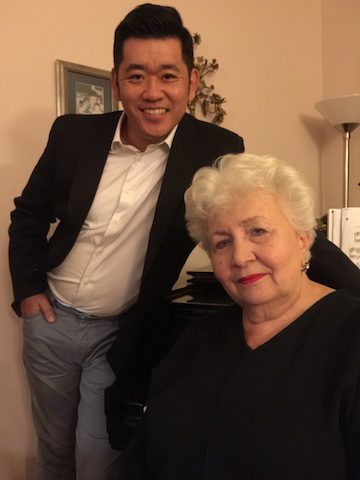Chinese Tenor to Star in Tchaikovsky Tribute
By • December 3, 2019 0 1457

Growing up in Hohhot, capital of China’s Inner Mongolia Autonomous Region, Fanyong Du sang, though only for pleasure. “Singing for us is just like daily life,” he says. Du’s serious training was athletic rather than musical, focused on competitive ping-pong and ice skating.
But it so happened that a singing teacher, Elvira Letyagina, from Odessa National Academy of Music in Ukraine heard him sing. Hohhot was the final posting in Letyagina’s eight-year Friendship Award teaching stint in China. And her translator in Inner Mongolia was Du’s neighbor.
Realizing she had found a gem in the rough in this northern region of grasslands and desert — on the southeastern border of the country of Mongolia, formerly (with some territorial variations) Outer Mongolia — Letyagina arranged to bring Du to Odessa in 2003, the only Chinese student to whom she gave this opportunity.
After a dozen years in Odessa, and several in New York, Du will be featured in the Russian Chamber Art Society’s holiday tribute to Tchaikovsky on Thursday, Dec. 12, at the Embassy of France. Accompanied by RCAS founder and Artistic Director Vera Danchenko-Stern, he will sing 12 art-songs, known as romances, of the more than 100 Tchaikovsky wrote.
The concert, a celebration of Russia’s best-known composer in advance of his 180th anniversary year, is a rare chance to hear pieces by Tchaikovsky other than “The Nutcracker,” “Swan Lake,” “The 1812 Overture,” the Sixth Symphony and other frequently played works.
Also on the program is the composer’s Trio in A Minor, Op. 50, performed by three exceptional instrumentalists: violinist Katya Poplyansky, cellist Souren Bagratuni and pianist Alexander Shtarkman. Poplyansky was recently a Rebanks Fellow at Canada’s Royal Conservatory; Bagratuni, chair of strings at Michigan State University, was a silver medalist in the 1986 International Tchaikovsky Competition; and pianist Alexander Shtarkman is a faculty artist at Baltimore’s Peabody Conservatory.
Du’s culture shock, relocating from Inner Mongolia to Ukraine at age 16, was one thing; moving to New York in his late 20s to study at Manhattan School of Music, then Mannes School of Music, both top conservatories, was another. (Du also spent time with famed baritone Renato Bruson in Italy, thanks to a sponsor who heard him compete in the Ningbo International Vocal Competition, near Shanghai.)
Self-taught in English, partly by starting up conversations with Manhattan dog-walkers, Du was handed roles on account of his lyric tenor voice, but without the patient, attentive guidance he had received in Odessa. “In America, you have to bring the role ready to go,” he says. “Time is so expensive.”
A pianist trained at Moscow’s Gnessin Institute, Danchenko-Stern — who taught singing in Russian at Peabody for decades and helped prepare the chorus in last season’s Washington National Opera production of Tchaikovsky’s “Eugene Onegin” — met Du last summer while coaching the singers in the Eurasia Festival’s condensed performance of “Onegin” in New York.
Du, who played Lensky, doesn’t get the chance to speak, much less sing, Russian often in the U.S. But, “for me, Russian is my second language,” he says. “If somebody is speaking Russian, I feel so touched.”
Mastery of a song’s language is not enough, of course. “Not every singer, especially at a young age, has that finesse and deep understanding of poetry and music,” says Danchenko-Stern. For the Dec. 12 concert, she made a list of about 25 Tchaikovsky songs, later reduced to 12. Du knew three of them; the others he had heard but not studied. So the pair got to work, going over the words and fine-tuning the phrasing and expressiveness.
Pointing to his temple, Du says, “You have to be ready here, first.” Adds Danchenko-Stern: “He has to live 12 lives, different lives, onstage.”
Tribute to Tchaikovsky
Russian Chamber Art Society
Thursday, Dec. 12, 2019, at 7:30 p.m.
Embassy of France, 4101 Reservoir Road NW
Tickets: $55, including post-concert reception

